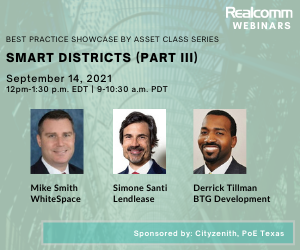How “ESG-ing” Drives Value by Building Trust

COVID-19 profoundly altered our understanding of how we build and sustain trust. For one, organizations are taking a longer view of value and the social impact of their corporate philosophy and decisions. Real estate companies are looking to build sustainable trust in how they invest and develop, and how they support the health, safety, and well-being of occupants and surrounding communities.
Real estate’s stakeholders extend beyond investors, owners, operators, and tenants to also include members of a much broader community. Now, more than ever, the industry has a responsibility to build trust with its many stakeholders by demonstrating that it is a good steward of the environment and a committed contributor to society. Increasingly, real estate organizations are adopting environmental, social and governance (ESG) initiatives to demonstrate a commitment to corporate responsibility and sustainability, and show investors and the public how they are working to address issues like climate change, social equity, and diversity.
ESG aims to instill a sense of purpose by encouraging businesses to become prudent caretakers of the planet and its people – and not necessarily for profit, though that may follow. Company commitments should spring from a genuine desire to make a difference. But as we see more investors and consumers also increasing their focus on ESG, the real estate industry is beginning to understand just how ESG efforts can create competitive advantages and the many ways that purpose can lead to profit.
An effective ESG program should be built using both a top-down and bottom-up approach that includes solid cultural changes within the business. For many real estate companies, ESG can be an impactful way to boost business performance, burnish reputations, and improve employee satisfaction, safety, and productivity. To deliver upon those outcomes, the real estate sector must understand that ESG is a human discipline based on trust.
Are you ESG-ing?
While many real estate business leaders know what ESG is, they don’t understand the specifics of how to flip the noun into a verb. How do you ESG? The industry has been and is currently “ESG-ing” in some ways. The built environment itself is a significant factor in global environmental initiatives. Technology has enabled healthier building strategies that help address concerns of tenants and surrounding communities. But it’s defining corporate goals and aligning actions to espoused values that creates real movement.
There is no uniform approach to determining which initiatives will be critical to the long-term ESG success of a business – whether in real estate or another industry. In working with clients to develop ESG strategies, we recommend starting with an analysis of the organization’s current values and operations, and future ambitions. This will help establish which corporate responsibility initiatives will have the greatest impact or best support desired outcomes over time. To do so, organizations need to assess existing social responsibility strategies and identify new initiatives, set metrics to measure success, and communicate consistently.
To walk the talk, strong data strategy and measurement are critical
Business performance is typically defined by empirical metrics like operational key performance indicators (KPIs), revenues and profits, and customer satisfaction. Unfortunately, for ESG, standards for scoring and reporting don’t yet exist. Companies must decide for themselves which ESG goals are material to business performance, how to analyze relevant data in the right context, and how to best report the results.
Understanding data is a challenge for many real estate companies. Some rely on data specialists to design a purposeful strategy that puts data to work. But organizations that use the right data to report on ESG factors can gain critical competitive advantage by understanding and acting on the information. The challenge is to understand data across multiple dimensions. Not just what quantitative data and at what level of granularity across the axes of greater or lesser, more or less. More importantly, it will be integrating qualitative metrics that indicate on patterns, tenor, and cadence of behavior.
Real estate businesses will need to understand where data lives, who can access it, how to collect it, and how to measure and use it, as well as how to structure it in a way that can be understood by a full range of stakeholders. A data management strategy that embraces fundamentals like data integrity and quality will be critical. Achieving this deep visibility into data can help inform a core business strategy and help with planning for the future.
Reporting is central to measuring and understanding ESG performance data. An ESG program will require accurate, relevant, and contextualized reporting. Real estate firms should be prepared to collect and analyze data across a composable enterprise of systems, that include internally gathered data as well as external data sources. Data repositories will become richer over time with more and more controls and sensors becoming smarter, with the enrichment of real estate adjacent data, and with our ability to leverage into artificial intelligence and machine learning to move beyond predictive to pre-emptive data sets.
ESG is everybody’s business
There’s no single model for building an ESG program, and each business will have its own values and situations to consider in building its ESG roadmap. Charting your journey will require agility throughout the organization, and demand resilience of and in every person. Understanding and addressing the ESG priorities of all stakeholders – what they expect, what they are doing now – is critical in assessing which initiatives are the most valuable – and putting together an ESG strategy can deliver upon the trust required from and expected by all.
Tenants: As COVID-19 lingers, many tenants will require buildings that promote health and well-being, in addition to being eco-friendly. They are looking for sustainable facilities with contactless switches, advanced air filtration, and automated heating and cooling. Some of these technologies generate a lot of data about building occupants, however, and tenants will want assurance that information collected from or about them is being used prudently to improve their environments— without impairing data privacy.
Employees: Younger workers are elevating the importance of ESG as they ascend the organizational chart. The next generation of talent is looking for work with a purpose. They are loyal to employers and brands that support their social, political, and diversity values. Earning their trust can be an impactful way to boost employee satisfaction, workplace health and safety, and productivity for the entire workforce.
Surrounding communities: At a macro level, ESG, like real estate, runs on a global scale. “E” is a global concept; carbon is carbon in Texas, as it is in Russia, as it is in Hong Kong. “G” comes down to the region and local regulations – the European Union vs. the U.S., for example. But the actual execution of “S” is in your backyard. Inclusivity, equality, and diversity are social factors that vary across communities and geographies. Still, organizations should foster a global view that pushes social responsibility to the smallest of villages. The goal is to play a role and help a community evolve to fit the needs of the people within it.
Investors: Increasingly, investors want a full account of a company’s ESG efforts—and outcomes—before they invest. Now more than ever, companies must demonstrate that they have clear ESG goals and sound business strategies in place to support them, in addition to enhancing operational agility, protecting tenant stickiness, and governing processes and risk strategies. Those that do are able to better deliver on the trust required to secure equity from today’s leading investors.
Developers: Real estate developers have increasingly been committing to ESG by designing and constructing environmentally green and sustainable buildings. Green buildings typically are energy-efficient, use renewable energy, and are constructed of eco-friendly materials. Real estate developers are adding enhancements like grass roofs and contactless switches to enhance occupants’ well-being. They are also beginning to invest in properties located in underserved areas with a goal of helping to address the inequities in low-income housing.
Owners / operators: Many companies already aspire to reduce the impacts of their energy consumption. Yet a building’s carbon footprint also depends on what it is used for (the purpose, not the place) and other factors like the availability of public transportation. Real estate owners and operators should also have a genuine commitment to social and environmental responsibility and understand why they care about certain issues. That’s critical because why is essentially strategy.
Trust takes transparency
Finally, as organizations develop and execute on their ESG plans, it will be critical that along the way they provide transparency into their priorities, processes, and outcomes. Healthy governance and transparency are the foundation upon which trust is maintained across all stakeholders. To boost transparency, some businesses are voluntarily disclosing ESG performance and exposure to risks. Others are strategically building consumer and investor awareness of their ESG commitments. Becoming transparent will require extensive communications with stakeholders, genuine human interactions, and an unwavering commitment to honesty. Visit our CohnReznick “Building Trust,” resource center.
 Ira Weinstein, Managing Principal, Real Estate, Cannabis Industries, CohnReznick
Ira Weinstein, Managing Principal, Real Estate, Cannabis Industries, CohnReznick
Ira Weinstein serves as CohnReznick’s Managing Principal – Real Estate, Cannabis Industries, where he oversees the advisory, assurance, and tax services pertaining to both industries. His role is to develop and execute strategy that grows the capacity and capability of the firm’s resources.
 Tama Huang, Chief Innovation Officer, CohnReznick
Tama Huang, Chief Innovation Officer, CohnReznick
Tama Huang is Chief Innovation Officer. A member of CohnReznick’s senior leadership team, she leads a culture of innovation – cultivating teaming across the Firm to generate new ideas, implement emerging technologies, and improve procedures to drive growth for CohnReznicks and its people.
 Julie Miner, Partner, RE Advisory Svcs Leader/Americas, CohnReznick
Julie Miner, Partner, RE Advisory Svcs Leader/Americas, CohnReznick
Julie Miner is a partner with CohnReznick who brings more than 18 years of professional experience and substantial knowledge of project management, discovery, analysis and design to create solutions that meet the real-world requirements of commercial real estate organizations.
This Week’s Sponsor
CohnReznick have dedicated real estate professionals who help clients manage current business realities while mitigating risk and planning for the future. The firm works with organizations to improve operational and financial processes, implement leading technologies and leverage best practices in process redesign to drive efficiencies and increased profitability.
Read Next
 5/29/2025
5/29/2025
AI Can’t Fix Bad Data. These Ideas Can Get You on the Right Track. Real estate visionaries constantly integrate innovative technology to make their organizations more efficient.
 5/22/2025
5/22/2025
Managing Building Automation and Integration Like an Investment Portfolio What if your building automation and integration decisions were managed with the same precision, discipline, and long-term vision as Warren Buffett’s investment portfolio?
 5/15/2025
5/15/2025
Tech, Talent and Transformation: 2025 Digie Finalists Announced For 27 years, Realcomm has presented the Digie Awards to acknowledge companies, real estate projects, technologies, and individuals that have advanced the commercial real estate industry through the strategic use of technology, automation, and innovation.
 5/15/2025
5/15/2025
Empowering Space Management with Data-Driven Visualization For effective CRE space management, it’s critical to centralize lease data, maximize rental square footage (RSF), improve energy efficiency and reconfigure spaces to meet changing needs.








%20(1)%20(1)%20(1).png)



